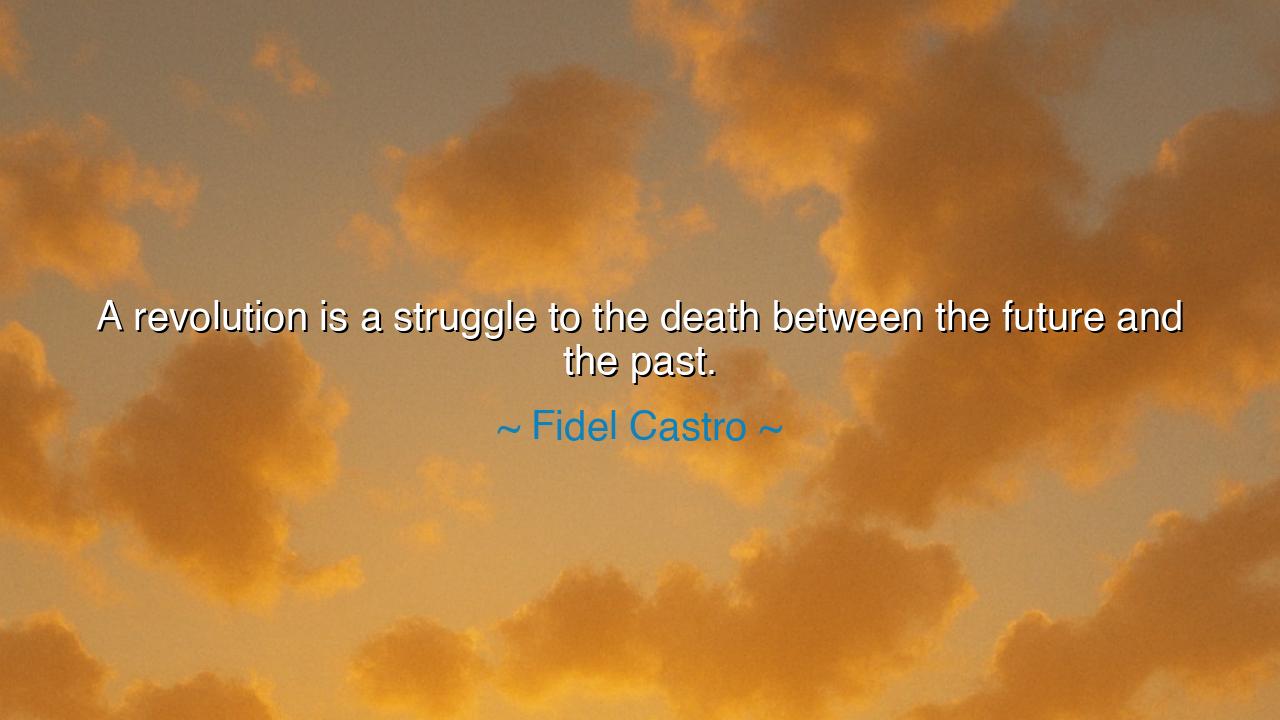
A revolution is a struggle to the death between the future and






When Fidel Castro declared, “A revolution is a struggle to the death between the future and the past,” he spoke of the eternal battle that every society faces when it moves toward progress. His words capture the essence of revolution as a moment of transformation, a pivotal time when the old ways of life are violently overthrown in favor of something new and unpredictable. This struggle is not just a physical battle, but an ideological one, where the future—embodied by change, freedom, and progress—clashes with the past, which seeks to maintain the status quo, preserve tradition, and hold on to established power.
The ancients understood this dynamic well. Plato, in his work The Republic, described a world where the old order was challenged by the new, where the philosopher-king would rise to challenge the tyranny of the status quo. The ancient Greek philosophers constantly questioned established beliefs, pushing for the enlightenment of the future even as the past sought to control them. Plato’s ideal state was one where ideas of the future could not be stifled by the weight of history, but where reason and vision were the guides for a better society. Much like Castro, Plato saw the struggle between the future and the past as an essential, though difficult, process of societal evolution.
The story of the French Revolution serves as another powerful example of this struggle. In 1789, the French people rose up against the oppressive monarchs of the past, driven by the ideas of liberty, equality, and fraternity—ideas of the future. The revolutionaries, led by figures such as Maximilien Robespierre, tore down the old order of absolute monarchy, replacing it with the possibility of a new and more democratic society. Yet, the revolution was not an easy or clean break. The old powers fought fiercely to maintain their dominance, and the revolutionaries were forced to confront not just the political system of the past, but also the deep-seated traditions and values that had defined French society for centuries. The outcome of this revolution was not just a change in government but a transformation of the social fabric itself, a struggle to the death between what had been and what was to come.
Similarly, the American Civil War was fought in part because of a clash between the future—represented by the expanding ideals of freedom and equality—and the past, embodied by the institution of slavery. The Northern states, driven by industrialization and abolitionist sentiments, fought to break the chains of the past, while the Southern states fought to preserve the old way of life. The war was a violent battle of ideologies, and its outcome was the liberation of millions of enslaved people and the beginning of a new chapter in American history. But the legacy of that struggle remains, as the forces of the past continue to clash with the promise of the future, reminding us that revolution is never truly over—it is an ongoing, evolving struggle.
Fidel Castro himself led Cuba through a revolution that sought to break the chains of colonialism and imperialism, challenging the old order of Western dominance over the Caribbean. His guerrilla warfare against the Batista regime was a struggle to the death between two forces: the past, represented by the dictatorship that had aligned itself with foreign powers, and the future, represented by the promise of social justice and national independence. Castro’s revolution was not just about changing political structures; it was about reshaping the identity of the Cuban people and asserting their right to chart their own course. Just as in the French Revolution or the American Civil War, the struggle was not simply about overthrowing an oppressive regime but about reshaping the very foundation of society.
The lesson we take from Castro’s words, and from the ancient philosophers and historical revolutions, is this: revolution is not a clean break from the past, but a violent transformation where the old order fights to retain its power while the future seeks to shape a new world. Change is often messy, filled with conflict, and not without great personal cost. Yet, it is in these struggles that societies evolve, pushing forward the ideas that will define future generations. Whether it is the abolition of slavery, the fight for women’s rights, or the dismantling of oppressive regimes, these are all revolutions in which the future seeks to conquer the past.
So, as you consider your own life, remember that you too are part of this eternal struggle between the future and the past. Each day, in your actions, you are either upholding the traditions that have come before or challenging them to make room for something new. The future belongs to those who have the courage to embrace change and fight for progress, even when the forces of the past resist. Whether in politics, art, or personal growth, you must decide: will you be a force that preserves the old ways, or will you be a champion of the new, willing to engage in the struggle that will shape the future?






AAdministratorAdministrator
Welcome, honored guests. Please leave a comment, we will respond soon